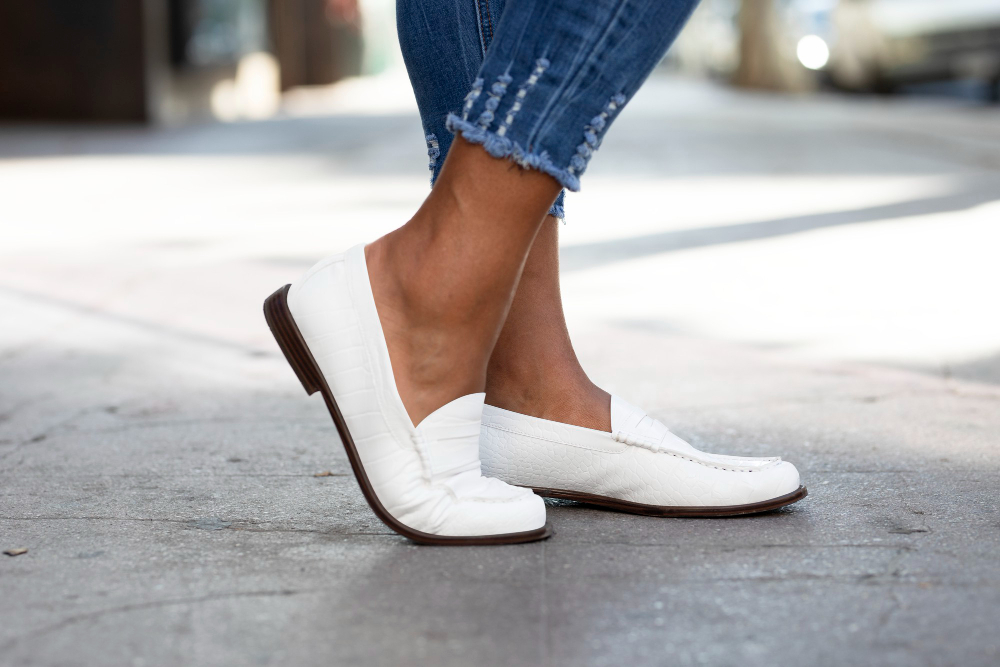If you love your high heels, you’ve probably read plenty about why they should be worn in moderation, and the impact they have on the structure of your feet. But what about flat shoes? How good are flats for your feet?
In many cases, they can actually cause pain and discomfort, and contribute or even cause some foot conditions. Flat shoes that are the culprits here are ballet flats, thongs/flip flops or any flat shoes with a thin sole and no support.
The problem with flat shoes is that they strain your sole, Achilles tendon and calf muscles, they have no shock absorption and your toes often do all the work to keep the shoe on.
Flat shoes can worsen or even cause the following foot conditions:
Achilles Tendinopathy
Flat shoes with minimal support will cause your Achilles tendon to work harder to keep the shoe on and the feet in alignment. This can lead to soreness in your Achilles tendon and your calves which are working harder to support your feet.
Find out more.
Plantar Fasciitis
The plantar fascia is the tissue that runs along the bottom of the foot, connecting the heel to the toes to form the arch of the foot. When this tissue is over-stretched or strained, small tears can occur in the fascia causing inflammation and pain. This is called Plantar Fasciitis.
Wearing totally flat shoes can strain the plantar fascia and your feet can become quite sore to walk on.
Find out more.
Neuromas
Have you ever felt like you had a pebble in your shoe under the ball of your foot? It’s most likely a neuroma. A neuroma which is also referred to as Morton’s neuroma, is a benign cyst that develops in the ball of the foot between the 3rd and 4th toes. The pain can be acute and stop you from being able to step on your foot.
Flat shoes that are also pointy will squash your toes and put unnecessary pressure on the ball of your foot, and possibly aggravate an existing neuroma, or cause one to grow
Find out more.
Flat Feet
Feet that have flat arches or “flat feet” aren’t actually flat. What’s happening is that they’re rolling inwards at the ankles and heels, which gives them the appearance of being flat. This rolling in motion is called overpronation. If your feet are overpronating, the outer part of your foot is touching the ground first when walking, causing the foot to roll into the arch, and in turn causing the arch to flatten.
Arches in feet can change over time and in certain circumstances. If you’re wearing a flat shoe without any support and your arches need some additional support during changes or pregnancy, then flats can make the condition worse.
Find out more.
Tips to choose a well-fitting shoe
A correctly fitting shoe will support you to feel good all day without thinking about or feeling any discomfort in your feet. A well-fitting shoe will:
- Support your foot to walk correctly without rolling out to either side or putting unnecessary pressure on specific areas of the foot
- Cushion the foot to minimise the impact of hitting the ground through your body
- Help your feet to feel snug and secure as you go about your day, therefore supporting your spine
- Maintain good energy levels as the day goes on because your feet are properly aligned.
If you are unsure about your shoes and which ones may be causing your feet problems, you can bring them into the clinic and we can assess your gait as well as your shoes. Book an appointment in one of our three clinics below.
Sander Podiatry Adelaide – 08 8379 1456 (Greenhill Podiatry)
Sander Podiatry Stirling – 08 8339 3344
Sander Podiatry Mount Barker – 08 8370 1590
Image by rawpixel.com on Freepik
